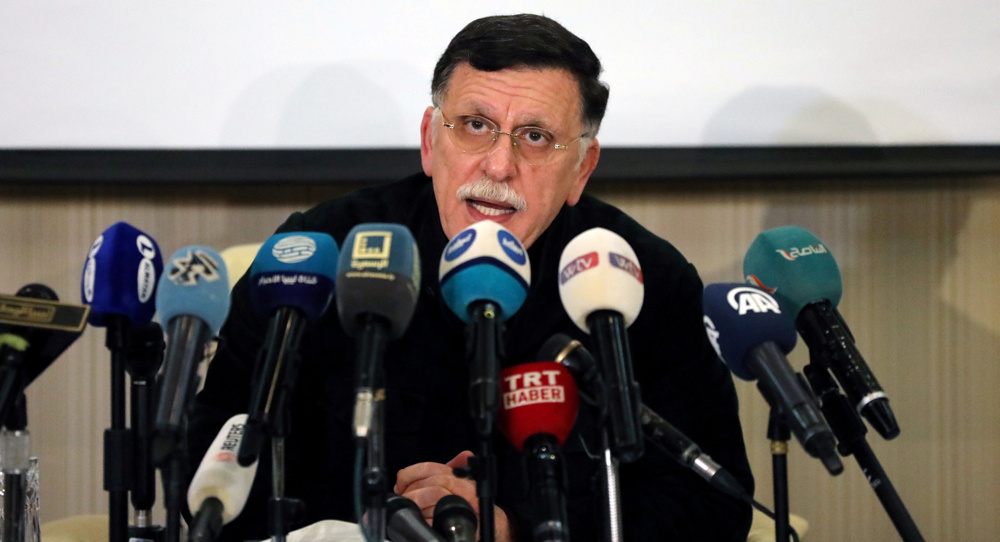Turkey to keep supporting Libya's GNA despite PM Sarraj’s plan to quit
Turkey says it will continue its cooperation with Libya's UN-backed Government of National Accord (GNA) despite Prime Minister Fayez al-Sarraj’s desire to step down by the end of next month.
Turkish presidential spokesman Ibrahim Kalin made the remarks on Monday, adding that Turkey will continue its support for the GNA as well as their bilateral agreements, including a security pact signed last year.
"These accords will not be impacted by this political period because these are decisions made by the government, not by any individual," Kalin said.
He also said that Turkish officials may travel to Tripoli "in the coming days" to discuss developments in the North African country.
On Thursday, Sarraj announced that he plans to quit by the end of next month, amid efforts to find a solution to Libya’s years-long political conflict.
The 60-year-old prime minister did not explain why he had decided to resign, but his government has been under pressure amid protests against deteriorating living standards, in large part caused by a rebel blockade of energy exports since the beginning of the current year. The blockade has cost the Libyan government 6.5 billion dollars in lost revenue.
On Friday, Turkish President Recep Tayyip Erdogan expressed regret at Sarraj’s stated intention to hand over power, saying, "Such a development, receiving this kind of news afterwards, was of course saddening for us.”
Since 2014, two rival seats of power have emerged in Libya, namely the internationally-recognized government led by Sarraj, and another group under renegade general Khalifa Haftar’s command and based in the eastern city of Tobruk, which is supported militarily by forces loyal to him and is collectively known as the Libyan National Army (LNA).
The strongman, who is primarily supported by the United Arab Emirates, Egypt, and Jordan, launched a deadly offensive to capture the capital Tripoli, the seat of the GNA, in April last year. Despite intense fighting, he has so far failed to achieve his objective of ousting the GNA, and the offensive has stalled outside the city.
Turkey has been of significant help to the Tripoli-based government in its defense against the LNA.
International attempts to bring about peace between the two warring sides have repeatedly failed. But the rivals agreed during talks in Geneva earlier this month to hold elections within 18 months and restructure the government.
Last month, the GNA declared a ceasefire and called for an end to a blockade imposed by the rebels on oil facilities in eastern Libya.
Haftar dismissed the calls, but said on Friday he would lift for one month his blockade on oil outputs and that he had agreed with the GNA on "fair distribution" of energy revenue.
The rebels started the blockade on the oil facilities in January, when they managed to take control of oil fields and export terminals in the east.
Libya, which sits atop the largest oil reserves in Africa, initially plunged into chaos in 2011, when a popular uprising and a NATO intervention led to the ouster of long-time dictator Muammar Gaddafi.
EU sanctions three firms for breaking Libya arms embargo
Meanwhile, the European Union has decided to impose economic sanctions on three companies for violating a United Nations arms embargo on conflict-torn Libya.
The companies are based in Turkey, Jordan and Kazakhstan, in the maritime and aviation sectors, unnamed EU diplomatic sources said on Monday.
Two Libyan individuals have also been hit with the sanctions for supplying war material to participants in the conflict in Libya.
EU foreign ministers agreed to sign off on sanctions at a regular meeting in the Belgian capital of Brussels.
The measure includes freezing any EU assets held by the companies as well as cutting them off from EU finance markets and barring them from doing business with anyone in the bloc.
Before these sanctions were pronounced by the EU, the bloc’s foreign policy chief Josep Borrell said there was reason for "cautious optimism" in the Libyan crisis.
"After many months I see a reason for cautious optimism. There is a positive momentum, there is a ceasefire and we need to use it," Borell said as he arrived for the meeting of EU foreign ministers.
The European Union has a naval mission to uphold the United Nations Security Council embargo on Libya.
The Monday measures are the EU’s first independent sanctions related to the conflict in Libya.
VIDEO | Report flags India’s violation of rights of Rohingya detainees
Turkey's foreign minister meets Syria's de facto leader in Damascus
'Next to impossible' to rescue patients from Gaza's Kamal Adwan Hospital: Director
VIDEO | Vietnam current prosperity
Report blames gasoil exports for shortage at Iranian power plants
VIDEO | Hind Rajab Foundation names Israeli war criminals vacationing after Gaza genocide
VIDEO | Australians rally for Gaza ahead of Christmas festivities
VIDEO | Attacks on Sana'a
















 This makes it easy to access the Press TV website
This makes it easy to access the Press TV website